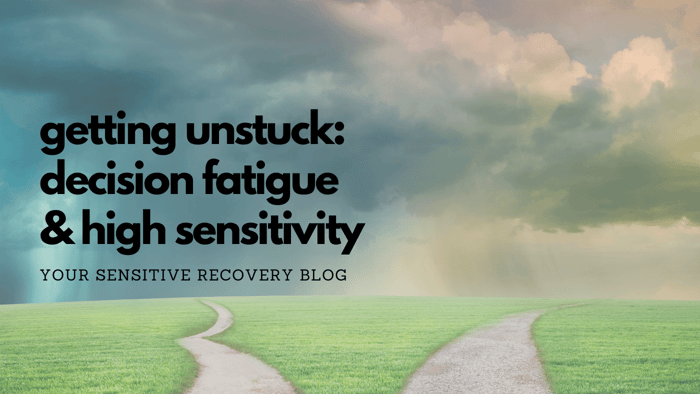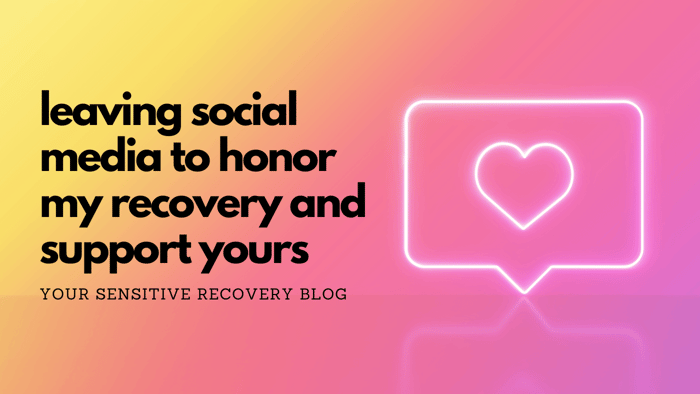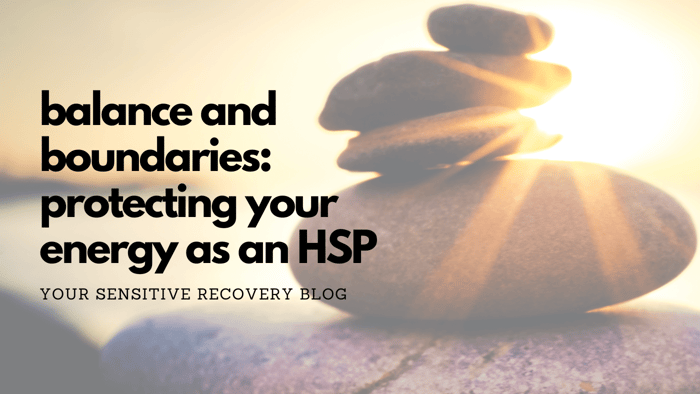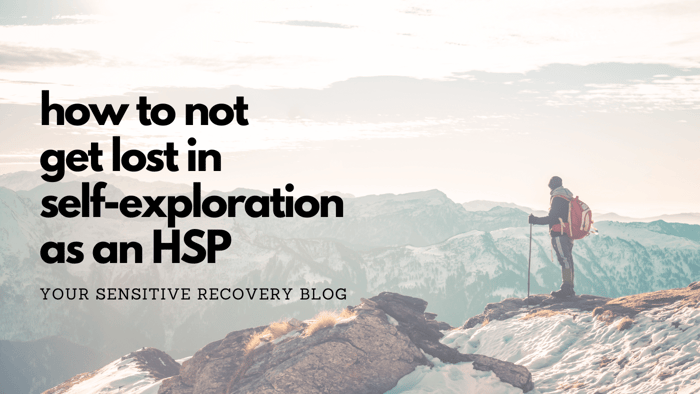Have you ever been paralyzed by the seemingly simple question, "Which restaurant should we go to tonight?" Or maybe you've read product reviews for so long your eyes are blurring, yet you're unable to just click that "buy" button? That mental strain and that sense of exhaustion at the mere thought of making a choice is more than just a rough day. It’s decision fatigue, and if you’re a Highly Sensitive Person (HSP), you might be especially prone to it.
In a world full of countless options and the pressure to get everything just right, it’s no wonder we often get so stuck. This post explores what decision fatigue is, why it can be so common and so draining for HSPs, and a few gentle tools to help you move through it when it shows up.
What is Decision Fatigue?
In the way that physical fatigue is a bodily weariness, decision fatigue is the mental and emotional weariness that comes from having to make too many choices over a period of time. It’s what happens when your brain simply runs out of decision-making energy.
You might picture this as something only super-busy, high-powered individuals deal with, but the truth is, decision fatigue touches all of us. It can show up in a hundred tiny moments, from picking out what shirt to wear, to choosing which route to take to work, to deciding which brand of peanut butter to buy.
The tricky thing about decision fatigue is that it can masquerade as laziness, avoidance, or anxiety. But really, your brain has just hit a limit, tuckered out from weighing options, predicting outcomes, and trying to keep you safe or “right.”What it can look like:
Flipping endlessly through a menu only to settle on the meal you always get but don't necessarily want.
Putting off important yet manageable tasks that involve choices.
Avoiding a necessary purchase, only to suffer from the lack of it later.
Spending hours researching, reading reviews, and getting feedback from others.
Feeling numb, irritable, or tearful over something that isn't a "big deal.”
Why Decision Fatigue Hits Harder for HSPs
As a Highly Sensitive Person, you take in more sensory and emotional information from the world around you. You think deeply, feel deeply, and often carry a strong sense of responsibility, not just for your own well-being but for how your choices might affect others.
Each decision, then, isn’t just about “this or that.” It's much more layered. HSPs are more likely to experience perfectionism and people-pleasing, two drives that can turn even simple choices into mental marathons.
To sum it up, Highly Sensitive People tend to consider the following four categories when making decisions, large or small:
- What feels best?
- Will I regret it later?
- What’s the most ethical or aligned choice?
- Would this disappoint someone else?
Even the noise of options, like having too many tabs open on your browser, too many voices in your head, too many “shoulds,” can lead to overstimulation and, eventually, overwhelm.
Simple Tools to Get Unstuck
My big brother's wise words come back to me when I find myself facing decision fatigue. I vividly remember the moment when this man, whom I've always looked up to, put his hands on my shoulders to stop my worried pacing, turned me to face him, and said,
"Josie, you've got to stop looking at every single decision as 'right' or 'wrong.' They're not. They're just different paths."Now, this shifted things immensely for me - my approach to a lot of things, really. But you don’t need to overhaul your whole life philosophy to move through decision fatigue. What helps most is softening your approach and letting things be a little easier, a little lighter, a little more guided.
1. Default to Some Simple Routines:
Pre-deciding some daily choices, such as what to eat for breakfast, when to leave for work, or what you’ll wear tomorrow, frees up mental space for bigger decisions that may require your attention later. Think of it as creating a loving, helpful autopilot mode.
2. Use Gentle Structure:
Rigid schedules can feel overwhelming, but a flexible rhythm can provide just enough of a container to reduce overwhelm. For example: “I’ll check in with myself at 3:30p and decide then whether to rest or take a walk,” instead of trying to plan your whole day upfront.
3. Make Value-Based Choices, Not Perfection-Based Ones:
Instead of asking, “What’s the right/best choice?” try asking, “What aligns with my values today?” This simple shift reduces pressure and invites self-trust. Make a conscious effort to put aside what other people might think by asking, "If nobody ever found out about this decision, what would I choose?"
4. Put a Cap on Input
When you’re already stressing about a decision, seeking too many opinions or researching more options only adds fuel to the fire. Try setting a limit, like asking one trusted loved one or reading just the 20 most recent reviews, then stop.
5. Take breaks
Sometimes you’re not indecisive, just genuinely tired. Give your brain a reset. Go outside. Take a nap. Stop scrolling. Do something physical. You don’t have to solve everything right away, and oftentimes, physical rest and rejuvenation can make a big difference.
You've Got This
Dear sensitive soul, if you’ve been feeling stuck or overwhelmed by even the smallest of choices lately, know this: it’s not a character flaw. It’s not because you’re lazy or incapable. It’s decision fatigue, and it makes perfect sense, especially for someone who thinks and feels as deeply as you do.
You don’t have to get every decision “right.” You just have to make one kind, aligned choice at a time. 💕
✨ Josie Munroe, LMFT is a licensed therapist and owner of JosieMunroe.com and Your Sensitive Recovery. As a recovered clinician and Highly Sensitive Person, she loves supporting others on their journeys to form new, empowered relationships with food, their bodies, and their sensitivity. Join the newsletter for a weekly boost of hope and inspiration. You deserve a recovery that works for you! ✨





